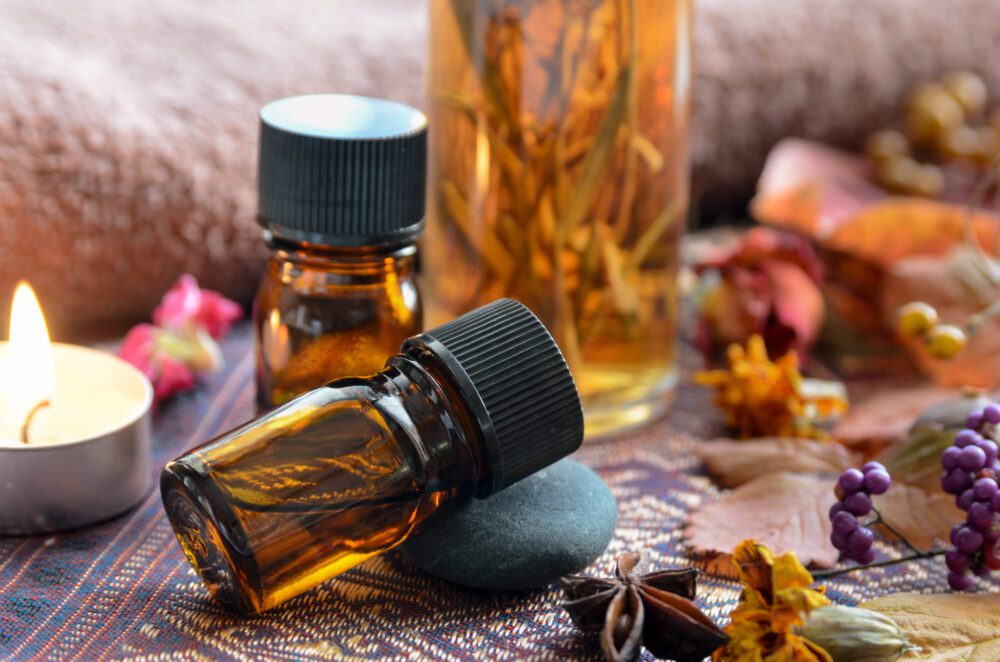Zuletzt aktualisiert am 10. Februar 2023 von Dr. med. Andrea Weidemann
Essential oils originated from concentrated plant extracts. These oils serve various medical purposes. People use essential oils as a natural mosquito repellent, or to help in reducing neck and back pain. What’s more, essential oils today also work out as depression treatment.
One thing to be noted here is, these oils do not contain any magical ingredients to cure depression. On the other hand, essential oils offer a huge benefit as a complementary therapy that goes side by side with other treatments for depression such as antidepressant and behavioral therapy.
How Do They Work?
The ingredients contained in essential oils have the capability to interact with our bodies once they are being absorbed through the skin. From here, those ingredients will access the bloodstream and stimulating the inhalation areas of our brain.
When the specialized nerve cells located in the upper part of our nose detect the smells from essential oils, they will send an impulse to our brain along the olfactory nerve to a specific area named the olfactory bulb.
Then, the olfactory bulb will process the impulse and deliver the information to other nearby areas of the brain which is known as the limbic system. This limbic system is a set of brain structures that play a great role in controlling our emotions, mood, and behavior.
How Effective Are They?
Many studies have recommended essential oils as a great treatment to reduce the symptoms of anxiety disorders which typically appear together with depression. Some research has also approved that using essential oils could improve sleep, enhance mood, as well as improving the quality of life.
Which Essential Oils Are Best for Depression?
To be noted, essential oils should never be swallowed as there is no evidence that proves that they are safe to be swallowed. In fact, each essential oil is quite different and some of them can even be dangerously toxic.
Below are the essential oils that can be used to relieve the symptoms of depression.
-
Valerian
Since ancient times, valerian is a well-known herb used to promote sleep and calming down our nerves. Inhaling this oil might make you become more relaxed, or even sleepy.
-
Jatamansi
Jatamansi belongs to the same plant family as Valerian herb. This essential oil has been used in ayurvedic therapy to calm down the brain and encourage sleep. A research conducted in 2008 has suggested that jatamansi can relieve the symptoms of depression. To use this oil, you could dilute it into your forehead.
-
Lavender
Lavender has been around with its popularity as an aromatherapy oil. In addition to this, a study performed in 2012 has demonstrated that this oil can calm down the symptoms of depression by stimulating the limbic system (a part of the brain that controls all of our emotions).
To get the benefit from lavender oil, you could mix a few drops of this oil into the warm bath water and enjoy a relaxing lavender bath.
-
Jasmine
Jasmine oil has known for its wonderful floral scent. A study conducted in 2013 has mentioned that inhaling this gorgeous oil can promote a sense of romance and well-being. Different from other essential oils, jasmine oil can calm down the nervous system without making us fall asleep.
To reduce the symptoms of depression, inhale jasmine oil directly from the bottle.
-
Holy Basil
Also known as tulsi, this holy basil contains eugenol, a compound that delivers a minty scent. Holy basil has been approved as an adaptogenic herb with an excellent capacity to treat physical and mental stress.
To use this essential oil, you could pour a few drops into an aromatherapy diffuser and inhale it.
-
Bergamot
Bergamot oil derives from bergamot oranges with an invigorating citrus scent. Research in 2015 has proven that bergamot oil helps to relieve depression symptoms and improve mood. To relieve the depression symptoms, you could put some drops of this essential oil onto a handkerchief or a cotton ball and inhale it.
-
Chamomile
Chamomile has been known for its relaxing and anesthetizing scent. This essential oil has a great function in relieving the symptoms of depression and anxiety disorder. To get the benefit from chamomile, you could dilute it into your skin or add a few drops into warm bathwater.
-
Lemon Balm
Lemon balm has a refreshing, uplifting scent. This essential oil has been used in aromatherapy as it has a soothing, healing effect. According to research in 2011, taking supplements or capsules made of lemon balm can improve sleep and help people to relieve the symptoms of depression.
To use lemon balm, you could inhale it directly, or add some drops into a diffuser to fill your entire room with its energizing scent.
-
Clary Sage
Clary sage is well-known for its woody, herbal scent. Its calming abilities make this oil commonly used as an aphrodisiac. Research performed in 2015 has proposed that clary sage can ease the tension and help in controlling the cortisol (stress hormone) level in women, which will eventually reduce the risk of depression and anxiety.
Inhale this essential oil directly from the bottle anytime you feel depressed, or you could simply massage your skin with diluted clary sage oil.
-
Rose
Rose essential oil originated from the rose petals that have a fascinating floral scent to relax the senses. Better yet, according to a study performed in 2014, using few drops of rose essential oil as a footbath can decrease depression in a pregnant woman during labor.
What to Do Before Using an Essential Oil
Some essential oils might not suitable for your skin which might cause you to suffer an allergic reaction. To prevent this, always do a patch test on a small area of your skin before using any types of essential oils.
Pour a few drops of essential oil on your elbow or wrist, then use a bandage to cover the area. Open the bandage and check the condition of your skin after 24 hours. In case if you see redness, rash, or feeling itchy, then that essential oil is not suitable for your skin to use.
Weblinks
- The 3 Best Essential Oils for Depression https://www.healthline.com/health/depression/essential-oils-for-depression
- Can essential oils treat depression? https://www.medicalnewstoday.com/articles/315481
- Top 4 Oils for Depression https://draxe.com/essential-oils/essential-oils-for-depression/
Sources
- The Effectiveness of Aromatherapy for Depressive Symptoms: A Systematic Review https://www.ncbi.nlm.nih.gov/pmc/articles/PMC5241490/
- Bushdid, C., et al. (2014). Humans can discriminate more than 1 trillion olfactory stimuli https://www.science.org/doi/10.1126/science.1249168
- Fung, T. K. H., et al. (2021). Therapeutic effect and mechanisms of essential oils in mood disorders: Interaction between the nervous and respiratory systems https://www.ncbi.nlm.nih.gov/pmc/articles/PMC8125361/
- Smith Lillehei, A., et al. (2016) Well-being and self-assessment of change: Secondary analysis of an RCT that demonstrated benefit of inhaled lavender and sleep hygiene in college students with sleep problems https://www.sciencedirect.com/science/article/pii/S1550830716301094
- Methods of application https://naha.org/explore-aromatherapy/about-aromatherapy/methods-of-application/
- Ko, L-W., et al. (2021). A pilot study on essential oil aroma stimulation for enhancing slow-wave EEG in sleeping brain https://www.ncbi.nlm.nih.gov/pmc/articles/PMC7806966/
- Park, H.-J., et al. (2015). Effect of the fragrance inhalation of essential oil from Asarum heterotropoides on depression-like behaviors in mice https://www.ncbi.nlm.nih.gov/pmc/articles/PMC4354743/
- Pergentino de Sousa, D., et al. (2015). A systematic review of the anxiolytic-like effects of essential oils in animal models. https://www.mdpi.com/1420-3049/20/10/18620/htm
- Ramsey, J. T., et al. (2020). Essential oils and health https://www.ncbi.nlm.nih.gov/pmc/articles/PMC7309671/
- Sánchez-Vidaña, D. I., et al. (2017). The effectiveness of aromatherapy for depressive symptoms: a systematic review. https://www.ncbi.nlm.nih.gov/pmc/articles/PMC5241490/

